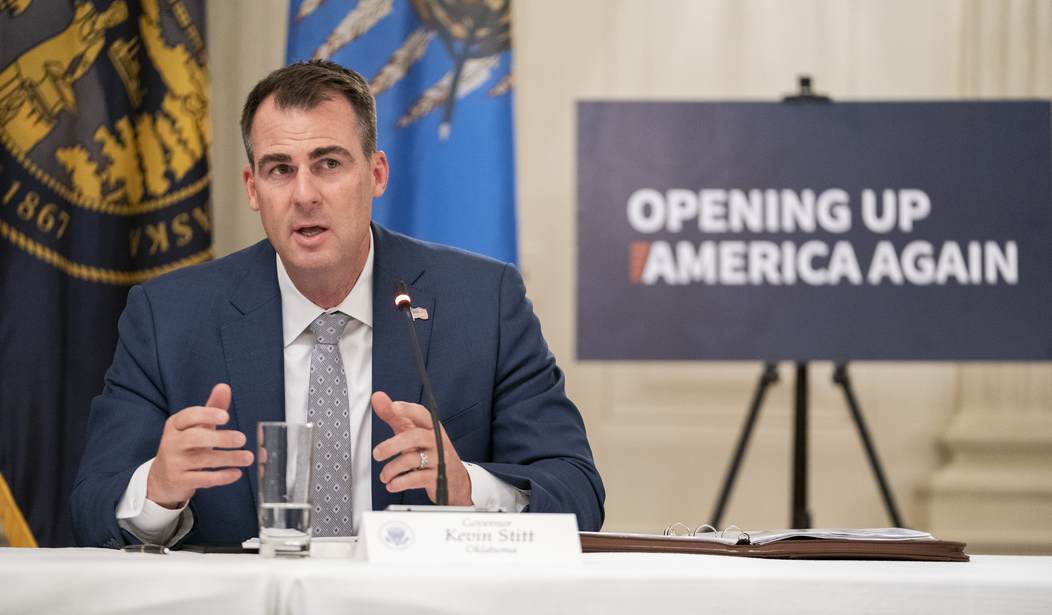The Supreme Court’s decision to effectively make eastern Oklahoma into Indian territory may force the state to sever into two. Why does that have to be a bad thing? Within the continental U.S., when it comes to states, the more the merrier.
If not for all the other crises and daily outrages boosted by mass media, the news of Oklahoma potentially losing half its state land to the sovereign nation of the Muscogee (Creek) tribe might have garnered more Americans’ attention for a bit longer.
The decision was led by Justice Neil Gorsuch, who despite being Trump’s first pick for the high court sided with the four liberal justices. They ruled narrowly that eastern Oklahoma was in fact Indian territory with regard to state criminal law, but the legal consequences will be innumerable.
All Americans should welcome this opportunity to reconsider their state borders as well as all regulatory boundaries.
Unfortunately, most conservatives haven’t latched on to that take. Sure, it’s not an ideal situation when a conservative state like Oklahoma gets politically upended by a few federal judges, but this can lead to a better outcome if a new state is a result.
Before getting into the benefits that Oklahoma residents may enjoy, let’s consider the wider ramifications for conservative victory nationwide.
After a favorable vote in the House of Representatives, Democrats are closer than ever to achieving statehood for Washington, DC. Yet Republicans have no national counter-strategy? Making DC a state has been a nationally unifying issue for Democrats, because they are well aware of the political stakes, including two new Democrats in the Senate.
Recommended
Republicans should be as unified across the country to support their own local efforts. There are many to choose from already. There are competing efforts to break away rural Californians from their state, and there are pushes to divide New York up into two or three chunks. This year, some Illinois counties will vote on removing Chicago from their state.
Kentucky, Maine, and West Virginia all became states after breaking off from another, so it’s not the crazy notion some opponents will make it out to be.
Similar campaigns are ongoing in Oregon (to join a new Greater Idaho) and Virginia (to become part of West Virginia). In relatively recent history, the proposed states of Northern Colorado and Superior (Michigan) have also been proposed.
Conservatives are well aware of the ungovernableness of many blue states. Take California for instance. Its state assembly is made up of 80 legislators, with each one “representing” roughly a half-million people.
Whether it’s taxation, gun control, or political underrepresentation, many Americans are realizing they need to vote with their feet and move or otherwise try a political solution that doesn’t wait on a federal election.
The Republican Party must pay closer attention, then get involved where it’s prudent. And it will be prudent somewhere soon because Democrats are the ones with the momentum to ensure permanent federal dominance for themselves in the near future. That is apparent in Arizona, Florida, Georgia, Texas, Virginia, and elsewhere.
As the French philosopher, Montesquieu said, “Power ought to serve as a check to power.”
That doesn’t strictly mean Republicans vs. Democrats, but rather, more importantly, it should mean the States vs. the Federal government. Conservatives will not fare well under a strong, centralized Democratic government, but if there are enough conservative states, a fully Democratic federal government will be nonetheless weakened by their uncooperation.
If the Democrats gain statehood for the District of Columbia or Puerto Rico, Republicans should work to add four states of their own to maintain competitiveness in the Senate and electoral college. The pursuit is worthwhile, however, even if Democrats claim a perpetual majority, simply because more states are harder for the feds to push around.
That’s what the Founders intended for this system of government, “laboratories of democracy” as Supreme Court Justice Louis Brandeis called the states.
Decentralization would benefit the Native Americans in eastern Oklahoma all the same. They pursued as much in the early part of the last century by proposing the State of Sequoyah. Now that area holds 60 percent of the refinery capacity of the fourth-largest oil-producing state.
As long as the federal government manages the land as its territory, the Native Americans can’t expect to reach the land’s potential for economic development or profit.
So, let Oklahoma come to discover there’s a silver lining in this seemingly dark cloud. Let the nation watch as more competition between states percolates, and let those who wish to go their own way do so as well.
Bringing state capitols closer to the governed will ease some of the political tensions dividing our country, and it will reduce Washington, DC’s grip on power to a more reasonable level as well. Conservatives must recognize this for their own political survival as well as for the sake of preserving America as a constitutional republic.

























Join the conversation as a VIP Member